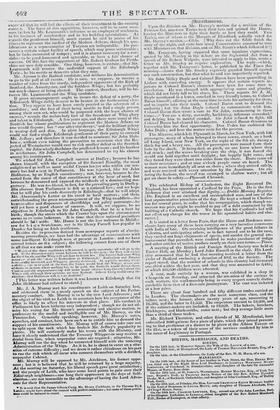Upon the division on Mr. Harvey's motion for a revision
of the Pension-list, nineteen Tories took their bats and quitted the House,
leaving the Ministers to fight their battle as best they could. Two Touies, one of whom is the Marquis of Illandford, actually voted for Mr. Harvey's motion.—Glebe. [ Why does not the Globe finish the story of the night, and state how ninny Conservatives remained to vote with Ministers on that division, and en Mr. Strutt's which followed it ?] Mr. Tennyson, having supposed that some injurious expressions, quoted by Mr. Stanley in the debate on the Septennial Act from a speech of Sir Robert Walpole, were intended to apply to him, wrote a• letter to Mr. Stanley to require explanation. The reply—which, together with Mr. Tennyson's letter, is published in the Times this morning—shows that Mr. Stanley expressly guarded himself against any such construction, but that what he said was imperfectly reported.
Sir John Milley Doyle and Colonel Bacon have been quarrelling in Lisbon with exceeding energy. It appears that certain reports in- jurious to Colonel Bacon's character have been for some time in circulation. He was charged with appropriating stores and plunder, which did not fairly fall to his share, &e. These reports Sir J. M. Doyle mentioned in a letter, couched in very friendly terms, to Colonel Bacon himself; offering at the same time to state his authority for them, and to inquire into their truth. Colonel Bacon sent to demand the authority ; but Sir John Doyle refused to communicate with him. Colonel-Bacon then wrote a note to Sir John, commencing in these terms—" You are a dirty, cowardly, backbiting, infamous scoundrel," and defying him to mental combat. Sir John refused to fight, till Colonel Bacon had cleared his character. Colonel Bacon threatens to horsewhip him the first opportunity. Don Pedro has cashiered Sir John Doyle; and here the matter rests for the present.
The Minerva, which left Plymouth in March, for New York, with 146 passengers, ninny of whom belonged to these towns, struck on a bank off Long Island, near New York, on the night of the 8th ult. during a thick fog and a heavy sea. All the passengers were roused from their beds by the shock. It being dark as pitch, no one knew where they had shuck; and the waves breaking over the ship, it was feared she
would not hold together until daylight ; but happily light came, and they found they were about two miles from the shore. Boats came off to their assistance ; and at nine o'clock people came on board. The women were immediately all sent on shore ; where they arrived safely, and were received with every attention by the Americans. On en- tering the harbour, the vessel was swamped in shallow water ; but all got on shore in safety.—P4moutk Chronicle.




















 Previous page
Previous page